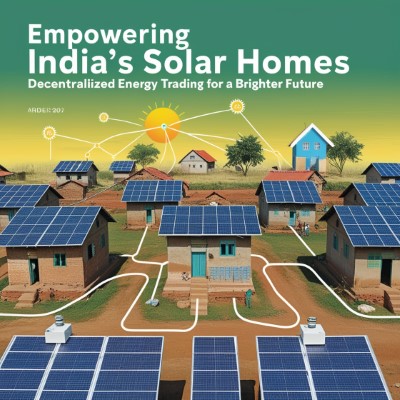A decentralized energy source system relies on local, distributed energy generation rather than centralized power plants. In such a system, individual homes with solar rooftops can produce and share energy, creating a more resilient and self-sufficient energy network.
Concept Explanation:
1. Solar Home Systems in India: India, having the highest number of solar home systems in the world, presents a unique opportunity for decentralized energy solutions. With many homes equipped with solar panels, the potential for interconnecting these systems is immense.
2. Interconnection and Energy Sharing: Homes with solar panels and batteries can be interconnected using a special device that facilitates energy trading. This device would allow homeowners to buy and sell energy to each other based on their needs. For example:
- A home generating excess solar energy can sell it to a neighbor who needs more power.
- During times of high energy demand, a homeowner can purchase additional energy from a neighbor.
3. Microgrid Formation: When multiple homes with these devices connect, they form a microgrid. This microgrid operates independently of the main power grid but can interact with it if necessary. Microgrids offer several advantages:
- Increased energy reliability and resilience.
- Reduced transmission losses since energy is generated and consumed locally.
- Enhanced energy security for rural or remote areas.
4. Expanding the Network: Microgrids can be linked to adjacent microgrids, forming a larger, stronger network. This interconnected network ensures that energy can be shared across villages, making the system even more robust and adaptable to varying energy demands.
5. Empowering Households: In a decentralized energy system, households have control over their energy generation and consumption. They are no longer solely dependent on the government or large utility companies for their power needs. This autonomy provides greater flexibility and potential cost savings for consumers.

Policy and Legality:
Energy Trading Legality in India: In India, the regulatory framework for energy trading, especially among individuals, is evolving. The Ministry of Power and various state electricity regulatory commissions have been supportive of initiatives that promote renewable energy and decentralized generation. However, specific policies and regulations can vary by state. As of now:
- Net Metering: Many states in India have implemented net metering policies that allow homeowners to sell excess solar energy back to the grid.
- Peer-to-Peer (P2P) Energy Trading: The concept of P2P energy trading is still in its nascent stages. Pilot projects and regulatory sandboxes are being explored to understand and establish the legal framework for such activities.
Before implementing a decentralized energy trading system, it’s essential to:
- Consult with local energy authorities and regulatory bodies to ensure compliance with existing laws.
- Stay updated on policy changes that may impact energy trading.
- Participate in pilot projects or regulatory sandboxes that facilitate the development of decentralized energy solutions.
By leveraging the widespread adoption of solar home systems and the potential for decentralized energy trading, India can create a more resilient, efficient, and consumer-empowered energy landscape.
